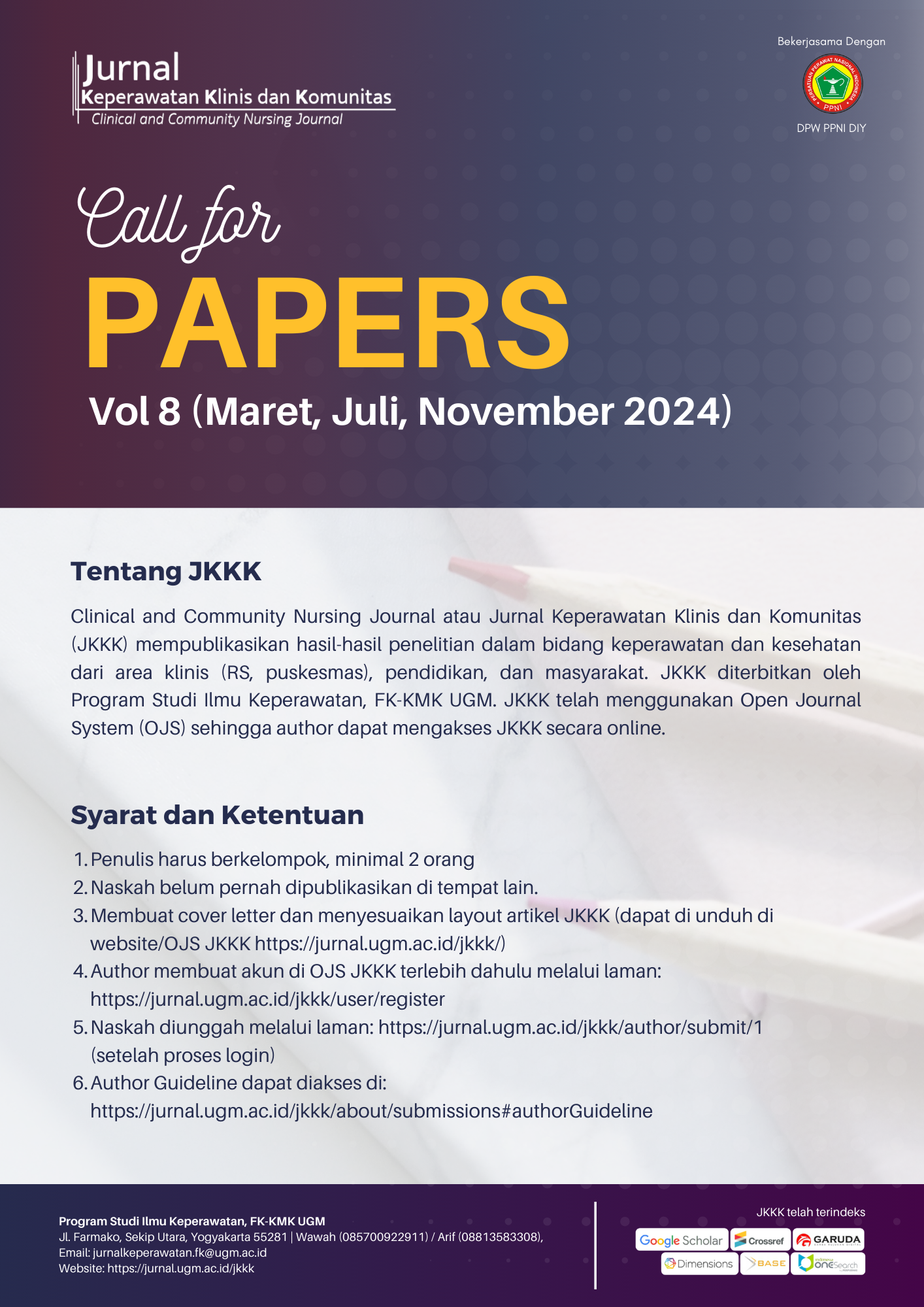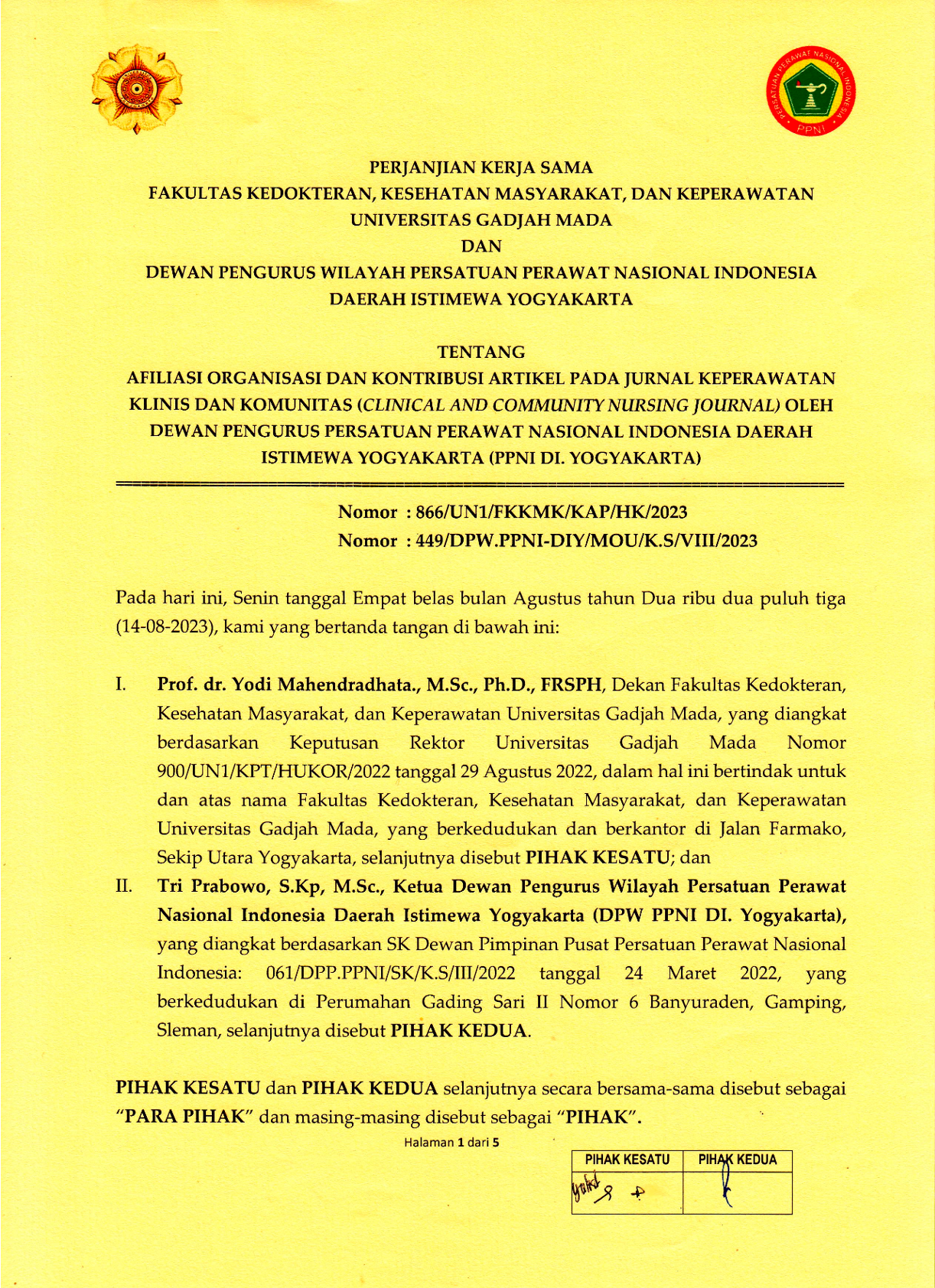Dukungan Sosial Keluarga dan Kualitas Hidup pada Pasien Pasca Stroke di RS PKU Muhammadiyah Yogyakarta
Nanda Kusumaningrum(1*), Melyza Perdana(2)
(1) CFHC FK-KMK Universitas Gadjah Mada
(2) Departemen Keperawatan Medikal Bedah Program Studi Ilmu Keperawatan Fakultas Kedokteran, Kesehatan Masyarakat dan Keperawatan Universitas Gadjah Mada
(*) Corresponding Author
Abstract
Background: Stroke stood at the third major cause of death globally, trailing only heart disease and cancer. Within Asia, Indonesia bears the highest burden of stroke patients (12,1%), with the Special Region of Yogyakarta being the second-highest province affected (10,3%). This condition brings forth disabilities and cognitive decline, leading to decrease of the patients’ quality of life. Consequently, stroke survivors often become dependent on family support. Despite these implications, family social support and its impact on the quality of life in post-stroke patients in the Special Region of Yogyakarta have not been extensively studied, necessitating this research to be conducted.
Objective: To investigate the relationship between family social support and quality of life in post-stroke patients at RS PKU Muhammadiyah Yogyakarta.
Methods: The study was analytic correlation conducted using a cross-sectional method at RS PKU Muhammadiyah Yogyakarta from April to May 2016. The research included 70 respondents and utilized the Family Social Supports Questionnaire and the Stroke Specific Quality of Life (SSQOL). Bivariate data analysis was employed using chi-square.
Results: Analysis of the data revealed that 90% of respondents reported good family support, while 8,6% perceived it as bad, and 1,4% deemed it very good. Meanwhile for the quality of life 82,9% rated it as good, with the remaining 17,1% expressing bad. The chi-square analysis yielded a p-value of 0,381 (p > 0,05).
Conclusion: There is no significant association between family social support and post-stroke patients’ quality of life at RS PKU Muhammadiyah Yogyakarta.
ABSTRAK
Latar belakang: Stroke menempati peringkat ketiga penyebab kematian tertinggi dunia setelah penyakit jantung dan kanker. Di kawasan Asia, Indonesia merupakan peringkat tertinggi pasien stroke (12,1%), dengan Daerah Istimewa Yogyakarta sebagai provinsi tertinggi kedua (10,3%). Kondisi ini menyebabkan kecacatan dan penurunan kognitif, yang mengakibatkan penurunan kualitas hidup pasien. Akibatnya, para pasien stroke seringkali menjadi bergantung pada dukungan keluarga. Meskipun demikian, dampak dukungan sosial keluarga pada kualitas hidup pasien pasca stroke di Daerah Istimewa Yogyakarta belum banyak diteliti, sehingga studi ini penting untuk dilakukan.
Tujuan: Untuk mengeksplorasi hubungan antara tingkat dukungan sosial keluarga dengan kualitas hidup pada pasien pasca stroke yang dirawat di RS PKU Muhammadiyah Yogyakarta.
Metode: Penelitian ini adalah penelitian analisis korelasi yang dilakukan menggunakan metode cross sectional pada April hingga Mei 2016. Penelitian ini melibatkan 70 responden dan menggunakan dua instrumen, yaitu kuesioner dukungan sosial keluarga dan Stroke Specific Quality of Life (SSQOL). Analisis data menggunakan uji Chi-square.
Hasil: Hasil uji statistik mendapatkan hasil bahwa 90% responden melaporkan mendapatkan dukungan sosial keluarga yang baik, sementara 8,6% menganggapnya buruk, dan 1,4% menyatakan sangat baik. Untuk variabel kualitas hidup, sebanyak 82,9% responden menilainya sebagai baik, dengan sisanya sebesar 17,1% menyatakan penilaian buruk. Hasil analisis Chi-square menghasilkan nilai p sebesar 0,381 (p > 0,05).
Kesimpulan: Tidak ada korelasi yang signifikan antara dukungan sosial keluarga dan kualitas hidup pasien pasca stroke di RS PKU Muhammadiyah Yogyakarta.
Keywords
Full Text:
PDFReferences
- Ginsberg MD. Neuroprotection For Ischemic Stroke: Past, Present And Future. Neuropharmacology. 2009:55(3); 363–389. http://Doi.Org/10.1016/J.
- World Health Organization. Stroke, Cerebrovascular accident [homepage on the Internet]. [cited Februari 2015] Available from: https://www.emro.who.int/health-topics/stroke-cerebrovascular-accident/index.html
- World Health Organization. The WHO STEP Stroke Mnual: The WHO STEP wise Approach to Stroke Surveillance. Geneva: World Health Organization. 2006.
- Battiaca, Fransisca B. Asuhan Keperawatan Dengan Gangguan Sistem/ Persarafan. Jakarta: Salemba Medika. 2008.
- Akosile CO, Okoye EC, Nwankwo MJ, Akosile CO, & Mbada CE. Quality Of Life And Its Correlates In Caregivers Of Stroke Survivors From A Nigerian Population. Quality Of Life Research. 2011: 1–6. Http://Doi.Org/10.1007/S11136-011-9876-9.
- Hadiati D. Uji Validitas Dan Reabilitas Stroke Specific Quality Of Life (Ssqol) Berbahasa Indonesia Pada Pasien Strok [Tesis]. Jakarta: Fakultas Kedokteran, Universitas Indonesia; 2014.
- Hasan N & Rufaidah ER. Hubungan Antara Dukungan Sosial Dengan Strategi Coping Pada Penderita Stroke RSUD Dr. Moewardi . Talenta Psikologi. 2013:.2(1); 41-62.
- Jaafar JL, Idris MA, Ismuni J, Fei Y, Jaafar S, Ahmad Z, Ariff MRM, Takwin B, Sugandi YS.The Sources of Happiness to the Malaysians and Indonesians: Data from a Smaller Nation. Procedia - Social and Behavioral Sciences. 2012; 65: 549-556,. 2012; 549–556. http://doi.Org/10.1016/J.Sbspro.2012.11.164
- Goldstein LB, Adams R, Alberts MJ, Appel LJ, Brass LM, Bushnell CD, Culebras A, Degraba TJ, Gorelick PB, Guyton JR, Hart RG, Howard G, Kelly-Hayes M, Nixon JV, Sacco RL; American Heart Association/American Stroke Association Stroke Council; Atherosclerotic Peripheral Vascular Disease Interdisciplinary Working Group; Cardiovascular Nursing Council; Clinical Cardiology Council; Nutrition, Physical Activity, and Metabolism Council; Quality of Care and Outcomes Research Interdisciplinary Working Group; American Academy of Neurology. Primary prevention of ischemic stroke: a guideline from the American Heart Association/American Stroke Association Stroke Council: cosponsored by the Atherosclerotic Peripheral Vascular Disease Interdisciplinary Working Group; Cardiovascular Nursing Council; Clinical Cardiology Council; Nutrition, Physical Activity, and Metabolism Council; and the Quality of Care and Outcomes Research Interdisciplinary Working Group: the American Academy of Neurology affirms the value of this guideline. Stroke. 2006:37(6):1583-633. doi: 10.1161/01.STR.0000223048.70103.F1.
- Appelros P, Stegmayr B, & Terent A. Sex Differences In Stroke Epidemiology: A Systematic Review. Stroke.2009:40(4); 1082–1090. http://doi.Org/10.1161/STROKEAHA.108.540781
- Kementerian Kesehatan RI. Riskesdas Indonesia Tahun 2013. Jakarta: Kementrian Kesehatan RI. 2014.
- Singhpoo K, Charerntanyarak L, Ngamroop R, Hadee N, Chantachume W, Lekbunyasin O, Tiamkao S. Factors Related To Quality Of Life Of Stroke Survivors. Journal Of Stroke And Cerebrovascular Diseases. 2012: 21(8); 776–781. http://doi.Org/10.1016/J.Jstrokecerebrovasdis.2011.04.005.
- Okthavia SW. Hubungan Antara Dukungan Sosial Keluarga Terhadap Tingkat Self Esteem Pada Penderita Pasca Stroke. Jurnal Psikologi Pendidikan dan Perkembangan. 2011: 3(2); 110–118.
- Effendy C, Vissers K, Tejawinata S, Vernooij-Dassen M, & Engels Y. Dealing With Symptoms And Issues Of Hospitalized Patients With Cancer In Indonesia: The Role Of Families, Nurses, And Physicians. Pain Practice: The Official Journal Of World Institute Of Pain. 2014:15(5); 1–6. http://Doi.Org/10.1111/Papr.12203
- Kruithof WJ, Van Mierlo ML, Visser-Meily JMA, Van Heugten CM, & Post MWM. Associations Between Social Support And Stroke Survivors’ Health-Related Quality Of Life-A Systematic Review. Patient Education And Counseling. 2013: 93(2); 169–176. http://Doi.Org/10.1016/J.Pec.2013.06.003
- Wardhani IO, Martini S. Hubungan antara karakteristik pasien stroke dan dukungan keluarga dengan kepatuhan menjalani rehabilitasi. Jurnal Berkala Epidemiologi. 2015;3(1): 24–34.
Article Metrics
Refbacks
- There are currently no refbacks.
Copyright (c) 2020 Nanda Kusumaningrum, Melyza Perdana

Jurnal Keperawatan Klinis dan Komunitas (Clinical and Community Nursing Journal)
collaborates with DPW PPNI DIY
![]()
Jurnal Keperawatan Klinis dan Komunitas (Clinical and Community Nursing Journal) is licensed under a Creative Commons Attribution-ShareAlike 4.0 International License.





